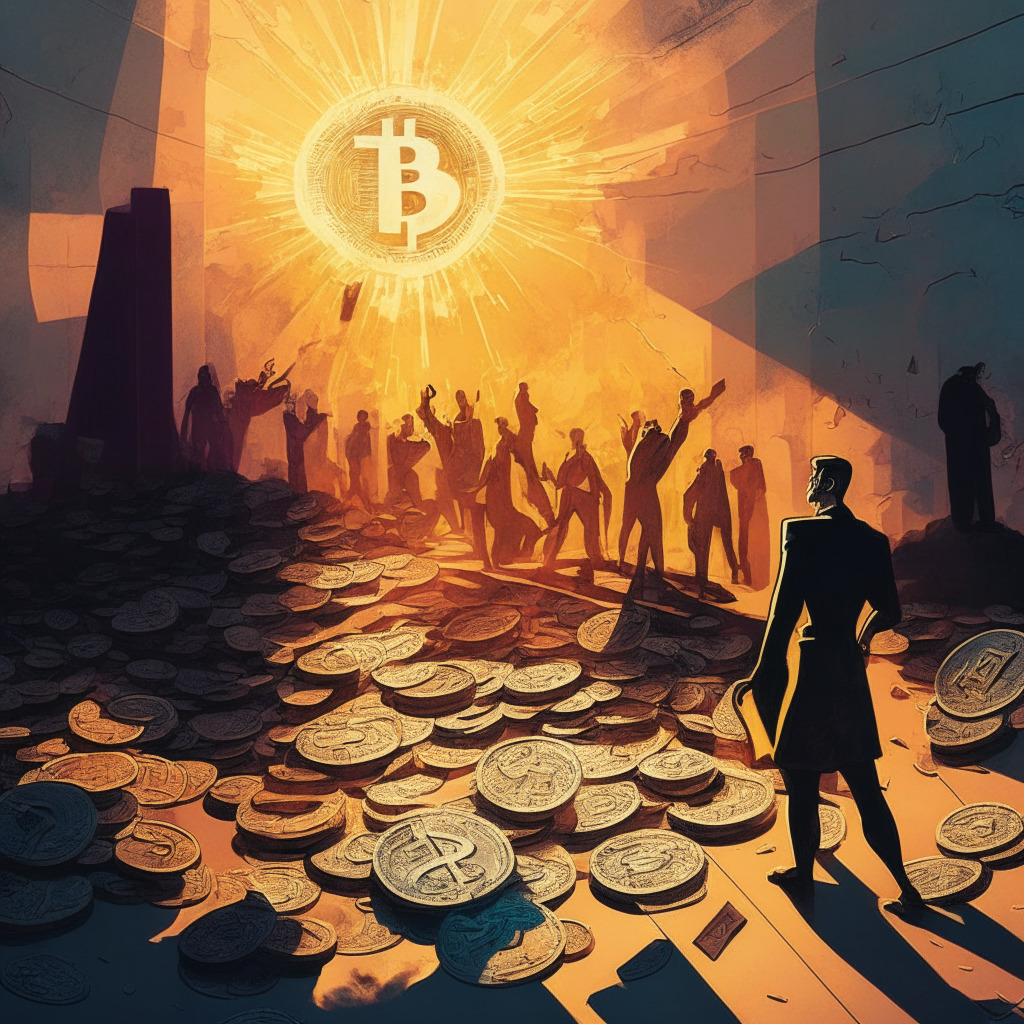Silvergate Bank’s demise, largely due to over-reliance on high-risk cryptocurrency deposits and internal managerial faults, raises questions about the risk exposure involved in being a single-industry lender. Amidst this, the crypto lender, Celsius Network, plans a recovery with a reorganisation plan, a move which is closely watched by regulators and businesses banking on crypto.
Search Results for: Silvergate Bank
Binance’s Ties to Signature and Silvergate Banks: Unraveling the SEC Lawsuit and Its Impact on Crypto
The SEC’s recent court documents reveal billions of dollars in Binance-related funds flowed through Signature Bank and Silvergate Bank, raising questions about Binance’s relationship with banks. The SEC found Binance, CEO Changpeng Zhao, and BAM Trading Services held accounts at both banks and alleges that millions of dollars from Binance-related accounts were commingled in Merit Peak’s accounts.
Elon Musk’s DOGE Lawsuit, Silvergate Bank Liquidation, and CBN’s Crypto Ban: A Tumultuous Week in Crypto
Elon Musk faces a proposed class action lawsuit by investors alleging manipulation of Dogecoin (DOGE) cryptocurrency, causing billions in losses. Meanwhile, private bank Xapo integrates with the SEPA network, and the US CFTC invites comments on risk management program changes.
Silvergate Bank Collapse: Lessons Learned on Crypto Regulations and Finance Challenges
Silvergate Capital will be delisting from the NYSE and cutting 230 staff members following a 93% decline in share price since 2023. The company faces regulatory inquiries and investigations, while its liquidation process emphasizes the importance of regulations and scrutiny for financial institutions connected to the cryptocurrency market.
Silvergate Bank Collapse: Impact on Crypto Industry, Clients, and Future of Banking
Silvergate Capital announces major workforce reduction, with only 80 employees remaining to liquidate its crypto-friendly bank. The bank, previously catering to clients like Coinbase and Gemini, faced heavy withdrawals, leading to a “challenging macro environment” and raising doubts about its future.
Silvergate Collapse: A Wake-Up Call for Crypto-Friendly Banking? Lessons & Future Implications
The recent collapse of crypto-friendly bank Silvergate has raised regulatory concerns and may serve as a wake-up call for the crypto community. The event highlights the need for a cautious approach when investing in digital currencies and the importance of market stability.
Bank Ruin and Crypto Scam: A Cautionary Tale from Kansas Heartland
“In a blow to Heartland Tri-State Bank, its CEO lost millions in a cryptocurrency scam. This incident highlights the risks attached to crypto investments, ultimately leading to the bank’s insolvency. The event underscores the need for regulation and vigilance in the crypto landscape.”
Balancing Skepticism and Hope: Insights on the Crypto World from a Central Banker
“Sarah Breeden, the incoming deputy governor of the Bank of England, voices concern over potential financial instability posed by cryptocurrencies. While acknowledging the benefits of blockchain technology, she emphasizes the need for a global regulatory approach to manage cryptos’ volatility and potential economic implications. She sees value in a central bank digital currency as an anchor, while warning against potential privacy issues.”
Falling from Grace: An Insider Look at Sam Bankman-Fried’s Legal Battle and its Implications on Crypto Market Regulation
“The U.S. DOJ requests dismissal of defense’s claims of misleading counsel for ex-crypto magnate, Sam Bankman-Fried, in his fraud case. They allege Bankman-Fried misled Silvergate Bank for company advantages and misused customer funds. He faces charges for diverting over $100M from FTX for personal and political gain.”
Crypto Tycoon Sam Bankman-Fried’s Battle with DOJ: A Chess Match with Far-reaching Implications
“The indictment of Sam Bankman-Fried, the force behind cryptocurrency exchange FTX, has raised questions about the legal framework surrounding blockchain technology. Accused of various fraud charges, Bankman-Fried’s defense insists that lawyers approved his contested actions at FTX. The case’s outcome could set important precedents for the crypto industry.”
Tether’s Banking Partnerships: An Advance Toward Global Inclusivity or a Regulatory Nightmare?
Tether, the issuer of popular stablecoin USDT, has partnered with Britannia Bank & Trust, a private bank based in The Bahamas, for processing dollar transfers. Notwithstanding critics’ doubts over the assets backing the $86 billion held by Tether, it accounts for around 66.5% of the total stablecoin market.
Sam Bankman-Fried’s Struggles and the Crypto-Banking Crisis: A Glimpse into Crypto’s Regulatory Turmoil
The excerpt provides insights into the ongoing struggle of former FTX CEO, Sam Bankman-Fried, in prison, amidst his trial on counts of fraud. It also discusses the tension between crypto entities and traditional institutions, highlighting the challenging relationship between Binance.US and the SEC. The piece emphasizes the importance of fair outcomes in legal trials and financial operations within the crypto world.
The High-Stakes Case of Sam Bankman-Fried: A Blinking Red Light for Crypto Regulations and Ethics
The high-profile case of Sam Bankman-Fried, co-founder of FTX, highlights the need for stricter regulation and greater accountability in the crypto industry. Allegations regarding fraudulent operations at FTX raise concerns about the ethics and legality of certain practices in the crypto sphere.
Regulatory Shift: The Stifling or Stability of Cryptocurrency in U.S. Banking
“The U.S. FDIC’s latest risk report indicates a shift from previously indifferent stance towards considering cryptocurrency as an area of concern. The 2023 Risk Review shows FDIC’s readiness to initiate discussions with banks about crypto-asset activities, echoing similar sentiments across U.S. banking agencies. Yet, it also reveals the complex balancing act required in integrating digital assets safely into the conventional banking system.”
Brazil’s CBDC ‘Drex’: Triumph in Banking or Gateway to Central Authority Meddling?
“Brazil’s Central Bank recently introduced its central bank digital currency, Drex. However, concerns are raised by the currency’s potential for central authority interference, alongside questions about the movement of assets of popular cryptos following the collapse of Silvergate Bank. Advocates, meanwhile, hail the currency’s potential to improve Brazil’s banking sector.”
Evolving Crypto-Banking Symbiosis: Spotlight on Customers Bank’s Emergent Leadership
“The rise of Customers Bank as the new favored banking partner in the US crypto industry highlights the complexities of financial relationships in this sector. However, as crypto firms rapidly switch to Customers Bank, concerns around market monopolization arise. This transition also exposes a tentativeness – navigating the line between leveraging opportunities and exercising caution in an uncertain regulatory climate.”
Collapsed BitGo-Prime Trust Deal: A Red Flag for Crypto Banking Stability?
The collapse of the acquisition between BitGo and Prime Trust highlights inherent risks and instability in the crypto banking industry. With setbacks generating significant concern about the stability and regulatory standing of crypto banks, investors and participants must remain vigilant and cautious when dealing with related ventures.
US Lawmakers Target Banking Failures: Impact on Crypto and Blockchain Industries
In response to major banks’ failures, US lawmakers from the House Financial Services Committee have introduced a series of bills, although not specifically mentioning crypto or blockchain. The future of regulations surrounding banks and their potential impact on the cryptocurrency and blockchain industries remain uncertain, with past lawmakers expressing optimism on stablecoin bills.
Binance-SEC Lawsuit: $70 Billion Moved Through Bankrupt Banks – Regulation & Transparency Debate
A Bloomberg report reveals that Binance and its affiliates moved $70 billion through Silvergate Bank and Signature Bank, raising concerns about funds movement transparency and banks’ role in the crypto industry. The SEC’s case against Binance alleges mishandling of client funds, while the exchange claims the transfers were part of regular business operations.
Revealed: Binance’s Influence Over Affiliate Binance.US Bank Accounts Raises Concerns
Bank records reveal Guangying Chen, a senior executive at Binance, as the primary operator for several Binance.US bank accounts, raising concerns about Binance’s influence over its supposed independent affiliate. This disclosure intensifies scrutiny as Binance faces legal action from U.S. regulatory agencies.
Binance Executive’s Control Over Binance.US Bank Accounts: Challenging Claims of Independence
A recent report reveals that a Binance executive had significant control over Binance.US bank accounts, raising questions about the subsidiary’s proclaimed independence. Despite Binance.US asserting operational changes, the ongoing connection with its parent company fuels skepticism and concerns regarding their relationship and regulatory compliance.
Creating the Ultimate Crypto-Friendly Bank: Overcoming Challenges and Seizing Opportunities
Santiago R. Santos recently proposed building a new “crypto-friendly bank” to fill the void left by the collapses of major crypto-friendly banks. Despite challenges, Santos envisions assembling a team, guided by his experience from the crypto and traditional finance worlds, to create a bank servicing individuals, businesses, and institutions in the ever-growing crypto industry.
Stablecoins: A Solution to Crypto’s Banking Crisis Amid Operation Chokepoint 2.0
Stablecoins may counter the impact of Operation Chokepoint on the crypto sector, providing a solution to the US banking crisis facing crypto companies. Leveraging stablecoins can minimize bank dependency and establish an autonomous parallel financial system, despite potential risks and regulatory challenges.
Bank Collapse: A Cautionary Tale of Crypto-Fear and Public Education
Barney Frank blamed industry outsiders for Signature Bank’s collapse, arguing their crypto dealings were “safe and sound” prior to regulators stepping in. Public confusion and “crypto-fear inaccurate withdrawals” contributed to the institution’s failure, highlighting the importance of educating the public to avoid future crises in the crypto industry.
Crypto Exchanges Face Banking Hurdles: Impact on Market & Need for Clear Regulations
Recently, Binance Australia suspended Australian Dollar bank transfers using PayID due to issues with its third-party payment service provider, while Crypto.com faces banking challenges affecting its liquidity. These incidents highlight the importance of establishing clear guidelines and a robust legal framework for cryptocurrency exchanges, ensuring a secure environment for digital asset transactions.
Failed Banks Blame Crypto: Is it Deflection or Legitimate Concern?
US Senators criticize executives of failed banks for deflecting responsibility for poor management onto digital asset firms. Senator Lummis highlights divergence in perspectives on digital assets’ role in recent bank failures. Transparency and accountability in banks dealing with digital assets are essential in building trust and adapting to the rapidly changing landscape.
Collapse of Signature Bank: Crypto Scapegoat or Executive Greed? Debating the True Culprit
Former Signature Bank chairman Scott Shay faces criticism for blaming the cryptocurrency industry for the bank’s collapse, while potentially collecting millions in bonuses and stock options. Senators Warren and Lummis argue that current laws allow executives like Shay to recklessly crash banks, jeopardizing the economy, and demand clawbacks of “crazy paychecks.” Blockchain understanding remains crucial amidst evolving digital asset complexities.
Collapse of Signature Bank: Crypto Exposure, Regulation, and Lessons for the Future
The collapse of Signature Bank highlights the potential systemic risks posed by crypto-linked banking activities and the importance of stringent regulatory oversight. It serves as a cautionary tale about unchecked growth, inadequate risk management, and the need for proper risk management practices in the volatile and rapidly evolving crypto industry.
FDIC Blames Crypto for Bank Collapses: Analyzing Risk Factors and Future Implications
The FDIC chair, Martin Gruenberg, attributes non-compliance with risk controls, poor governance, and dependence on uninsured crypto deposits to the collapse of crypto-friendly banks like Signature Bank and Silicon Valley Bank. While cryptocurrencies played a part, sound governance and responsible investments are essential for financial stability.
Crypto Bank Runs: The Role of Whales and Risky Investments in Market Turmoil
A recent study found that the 2022 crypto bank runs were majorly triggered by whale account holders withdrawing large portions of their funds. Crypto platforms’ run risks arose from allowing unrestricted withdrawals while using funds for risky, illiquid investments, highlighting policy concerns.
Signature Bank Collapse: Crypto Exposure’s Role and Lessons for Future Regulations
FDIC Chairman Martin J. Gruenberg suggests that the failure of Signature Bank may be partly due to its inability to comprehend risks tied to cryptocurrencies and inadequate management. While the direct impact of crypto exposure on the bank’s collapse remains unclear, it highlights the need for closer scrutiny on crypto market regulations.
Crypto Bank Closures: Striking a Balance Between Regulation and Innovation
Signature Bank reduced digital asset deposits due to increased volatility and regulatory concerns, according to former chairman Scott Shay. The collapse of three crypto-focused banks in March impacted the crypto industry, raising questions on whether regulatory intervention and banks’ decisions are necessary for financial stability or inadvertently stifle the growth of the crypto and blockchain industry.































